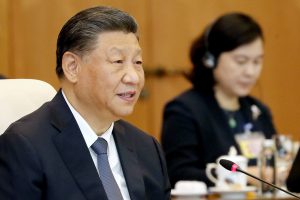The term “Global South” caught the world’s attention in 2023. In China, officials have traditionally avoided using the term, but Foreign Minister Wang Yi and subsequently President Xi Jinping himself eventually began to deploy it in response to global discourse. However, their use has been in quotation marks, indicating that the Chinese government has not given the term its official imprimatur.
So how does the Chinese government view the Global South and how does it use the expression?
China has been skeptical of the term “Global South.” Beijing views the world in terms of developed versus developing countries, priding itself on being the representative of the latter. By contrast, the term “Global South” sees the world as consisting of developed countries, confronted by China and Russia, with the remainder as the Global South. That is not the Chinese worldview.
Beijing was particularly rankled at not being invited to the Voice of Global South Summit 2023, which was held online and hosted by India on January 12-13, 2023. India, which also considers itself a developing country, left China out of the Global South and acted as if India were the grouping’s representative. Some Chinese observers say that this was because India does not consider China to be a developing country, but was also in retaliation for India not having been invited to the China-Indian Ocean Region Forum on Development Cooperation held in Kunming, Yunnan Province on November 21, 2022. However, the China International Development Cooperation Agency (CIDCA) has clarified that India was indeed invited to that forum, but chose not to participate. In India, anti-China sentiment has grown over the Sino-Indian border dispute, with the two powers noticeably bickering within other South Asian regional frameworks.
During the G-7 Hiroshima Summit in May 2023, the term “Global South” was used at press conferences, although it was not in the leaders’ communiqué. This usage prompted a backlash in China, but Chinese officials gradually began to use the term themselves, albeit in quotation marks. The quotation marks denote China’s disagreement with the concept. Wu Hailong, a senior official in the Ministry of Foreign Affairs and President of the China Public Diplomacy Association (CPDA), said in a June 2023 interview that “Some European and American countries adhere to the Cold War mentality, vigorously engage in group politics, and attempt to use the concept of ‘global south’ to divide and weaken the camp of developing countries, using ideology and social forms to draw lines and force developing countries to choose border status.” This is an argument that frames the Global South concept as part of Western countries’ attempts to contain China.
The turning point for China came with the enactment of the Law on Foreign Relations of China on June 28, 2023. (The law was enforced on July 1.) During the First “High-Level Conference of the Forum on Global Action for Shared Development” on July 10, Wang Yi, who is not not China’s foreign minister but also a member of the Political Bureau, stated, “As the largest developing country in the world, China is a natural member of the ‘Global South.’” Wang continued to refer to the Global South after this, such as at a preparatory meeting for BRICS. Following these statements, Foreign Ministry Spokesperson Mao Ning explained what the “Global South” means in China’s eyes: “The Global South is the family of emerging markets and developing countries.”
Wang then presented a “four-point proposal on strengthening Global South cooperation” that includes the following four points: “Firstly, to end conflicts and rebuild peace. Secondly, to promote development through revitalization. Thirdly, to seek progress with openness and inclusiveness. Fourthly, to pursue cooperation in solidarity.” Wang asserted that “independence is the political hallmark of the Global South, development and revitalization its historical mission, and justice its unyielding pursuit.” According to Wang, “China is an ex-officio member of the ‘Global South’ and will always be a member of the big family of developing countries.” With these words, China is repositioning the term “Global South,” demonstrating a different understanding of the term than that based on the worldview of developed countries.
However, the biggest turning point for the Chinese government came during the Closing Ceremony of the BRICS Business Forum 2023 on August 22, 2023, when Xi Jinping himself said that “As a developing country and a member of the ‘Global South,’ China breathes the same breath with other developing countries and pursues a shared future with them. China has resolutely upheld the common interests of developing countries and worked to increase the representation and voice of EMDCs [emerging markets and developing countries] in global affairs.” The fact that Xi used the term indicates that China has formally accepted it. Nonetheless, it is likely that China retains its own definition, at odds with that used by India and the West.
As China seeks to create a discursive space tailored to its own interests, it has conversely adopted a policy of reducing the effectiveness of discourse that it finds contrary to its advantage, as with “Global South.” In engaging with China, interlocutors should keep in mind that the definition of “Global South” in Chinese is not the same as it is in English.
































